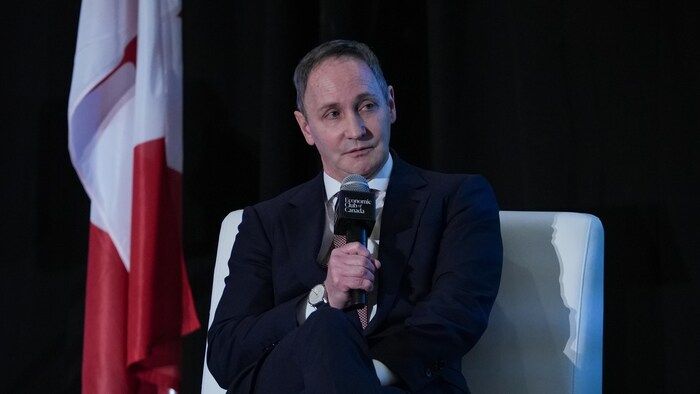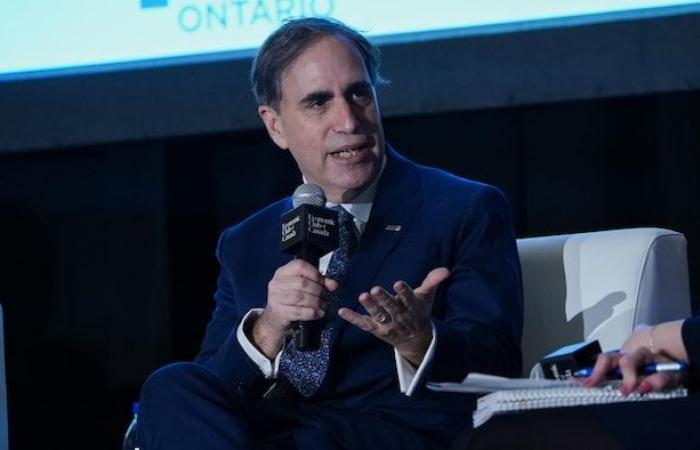“I don’t think there is anyone here who predicts a year of strong economic growth for Canada,” said Beata Caranci, the chief economist of the TD Bank, bluntly during a luncheon. -conference bringing together colleagues from major Canadian banks.
While it is difficult to predict a country’s economic trajectory in normal times, the current threat of a tariff war makes the task virtually impossible.
Open in full screen mode
Beata Caranci (center) is TD’s chief economist.
Photo : - / Yanick Lepage
Anyone who tells you they can quantify the impact of a bilateral trade war on the Canadian economy is lying
said CIBC’s Avery Shenfeld, citing comments allegedly made by former Bank of Canada Governor Stephen Poloz in a private meeting.
We cannot rely on the last time when a 25% tariff was suddenly imposed on exports from the entire country, he reminded. There is no last time.
Open in full screen mode
Avery Shenfeld is chief economist at CIBC.
Photo : - / Yanick Lepage
CIBC’s chief economist, however, pointed out that during Donald Trump’s first term, the 25% tariffs imposed on steel imports from Canada had taken 0.5% off the GDP canadian.
Multiplying that across the entire economy is bad
said Mr. Shenfeld.
What can Canada do?
According to the chief economists, a Canadian response to the imposition of possible tariffs would certainly have deleterious effects on the Canadian economy.
Currently, the federal government is refining a list of American products on which it could in turn impose a surcharge, from products made from steel to Florida orange juice, - has learned .
BMO’s Douglas Porter floated the idea, smirking, that Alberta could maintain its oil facilities for an entire month, which would prevent it from exporting oil to the United States .

Open in full screen mode
Douglas Porter is BMO’s chief economist.
Photo : - / Yanick Lepage
For the moment, the proposal to cut off energy and electricity supplies does not have consensus within the federation. Alberta, Quebec and Newfoundland and Labrador are fiercely opposed.
Regardless of the retaliatory measures, the United States is likely to be much less affected than Canada by the tariff war that is looming on the horizon, estimates Frances Donald, chief economist at the RBC.
She maintains that the economical immune system
of the United States is much stronger than that of Canada.
Unlike America’s immune system, which is more like those guys on Venice Beach who pump their muscles, ours is more like those kids who eat a lot of junk food and probably watch too much TV.
she illustrated, to the laughter of the several hundred guests gathered for the event.

Open in full screen mode
Frances Donald is chief economist at RBC.
Photo : - / Yanick Lepage
According to Stéfane Marion, of the National Bank, the federal government should above all review some of its own policies which, according to the economist, harm our competitiveness.
It targets above all the carbon tax and the increase in the inclusion rate on capital gains.
Despite significant uncertainty regarding the future of this second measure, for the moment, everything indicates that the tax forms for the current year will take into account the new inclusion rate on capital gains proposed in the last Liberal budget. .
I think Canada’s best retaliation against the United States is to make Canada more attractive [pour les investisseurs] than other countries. This means a corporate tax that is less punitive for Canadian businesses
declared Mr. Marion in an interview with -.
Canada saved by stock markets?
The chief economist of the National Bank, however, believes that American investors could force Donald Trump to withdraw his tariff threat.
The strength of the American economy is already preventing the Federal Reserve from lowering interest rates as quickly as the Bank of Canada. Possible tariffs would increase inflation, which would also put upward pressure on interest rates.
High long-term bond interest rates tend to pull down the value of stock market securities, explains the economist.

Open in full screen mode
Stéfane Marion is chief economist at the National Bank.
Photo : - / Yanick Lepage
The policies announced by Washington recently have been rather erratic. They seem to worry the market
argued Mr. Marion.
He even predicts a fall in American stock markets of 10% by the time Mr. Trump takes office on January 20.
It may ultimately be the markets that will discipline the American president.
And the Canadian dollar in all this?
The Canadian dollar will be substantially lower
if Mr. Trump carries out his threat, according to Avery Shenfeld of CIBC.
In 2024, the loonie lost 7.9% of its value, its biggest decline since 2015. It is today below the US$0.70 mark.
To the great dismay of Donald Trump, one of the consequences [des tarifs] will be that the US dollar will be pushed higher and, therefore, the ability of the United States to reduce its trade deficit will be greatly diminished
he argued.
Start of widget. Skip the widget?End of widget. Return to start of widget?
Addressing the gap between Americans’ global exports and imports has been one of Mr. Trump’s signature promises since entering politics.
But despite the protectionist shift orchestrated during his first term, the United States’ trade deficit has continued to grow. From January to November 2024, it totaled over one trillion (1000 billion) US dollars.










